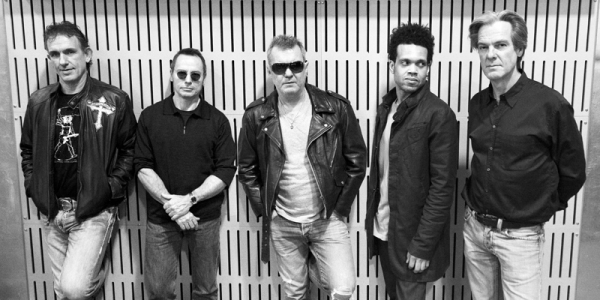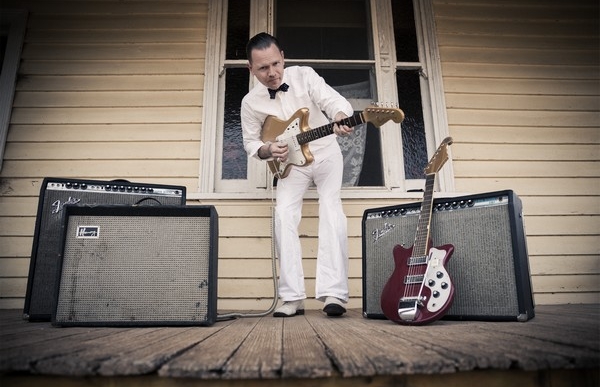“By the end of that tour we realised we’d actually started to find our groove with the new drummer and the newfound joy of playing together,” says vocalist Jimmy Barnes. “You tend to forget these things, or you take it for granted when you’ve been doing it for 45 years.
“When Steve died we had a bit of an epiphany where we went, ‘You know, we’re not here forever.’ We all love playing so much, but we just always presumed we’d always be here and we could play whenever we wanted.”
No Plans began to take shape following a one-off reunion show in 2009. Acknowledging the subsistence of their unique collaborative bond, the five-piece decided to have a crack at another album – albeit with a non-committal approach, hence the album title. When it came to The Perfect Crime, however,the process was far more deliberate.
“We wanted to make sure we went into the studio and had rock’n’roll songs,” says Barnes. “Because we’re not under pressure from the record company to make a record now, we just came into my house – I’ve got a recording studio here – and we put down eight or nine tracks and then we stepped away for six months and in that period we wrote another bunch of songs. Then we went into the studio again and recorded another ten or 11 tracks.”
The band have boldly hailed The Perfect Crime as the most rock’n’roll album in their extensive catalogue. Though, guitarist Ian Moss clarifies the implications of this claim.
“When we first started we were just typical teenagers who thought Led Zeppelin and Deep Purple were the be-all and end-all,” he says. “As we started writing songs and learning more we started going, ‘Well who did they listen to?’ You go back and it’s all the blues people or rock’n’roll – and the real rock’n’roll is from the era of people like Little Richard and Chuck Berry. When we say this is the most rock’n’roll album we’ve done, that’s what we’re talking about. It’s rock’n’roll as in that era, done in a Cold Chisel way and still sounding nice and present and ready for 2015.”
Cold Chisel’s eighth album arrives nearly 40 years since their self-titled debut. In the ensuing years they’ve not only created a bulletproof back catalogue, but also secured a loyal following and an enduring legacy. Nevertheless, they’re not ready to rest on their laurels.
“We’re still trying to make better and better records,” says Moss. “We want to make an album that satisfies us musically,” says Barnes. “Cold Chisel’s the sum of all the members, and we’re all so different. We listen to different music, we write different music, but when we get together and try to play it as one it comes out sounding like Cold Chisel.”
Prior to Chisel’s 1984 breakup, pianist Don Walker was the band’s leading creative force (though, that’s not to disregard the notable contributions of the remaining four members). Following the split, Barnes ignited an illustrious solo career, and is now a widely respected songwriter in his own right. Walker takes the majority of songwriting credits on The Perfect Crime, while Barnes is responsible for two songs (All Hell Broke Lucy, Long Dark Road), and there’s one each from Moss (Shoot The Moon), and bass player Phil Small (Get Lucky).
“I’ve not really been a prolific songwriter and I’ve got so much stuff lying moribund, on the wrong side of the finishing line,” says Moss. “But I went to Nashville last year at the inspiration of an Australian guy called Sam Hawksley who said, ‘Gather up all those ideas you’ve got lying around, we’ll put you together with some writers.’ [It resulted in] Shoot The Moon, a song I wrote with an Australian guy called Matt Scullion.”
Cold Chisel are hitting the road in early October for a massive Australian tour that’ll keep them busy right up until Christmas. Throughout all of their various activities, the band members haven’t lost the love for playing live. What’s more, they’ve also never ignored the demands of their audience.
“The albums are really a vehicle for us to play live,” says Barnes. “We get some new songs to go out and play live. We like our audience to be there with us and to be catching it. In that way the audience is a part of making the records as much as we are.”
“We put a lot of thought into our setlist, and there’s a minimum of 14 songs that we know we have to play if we want to get out alive,” says Moss. “That doesn’t leave a lot of space for new songs. We’d love to be able to do a lot more, but we’re grateful that we’re able to get out there and do any [laughs].”
BY AUGUSTUS WELBY

